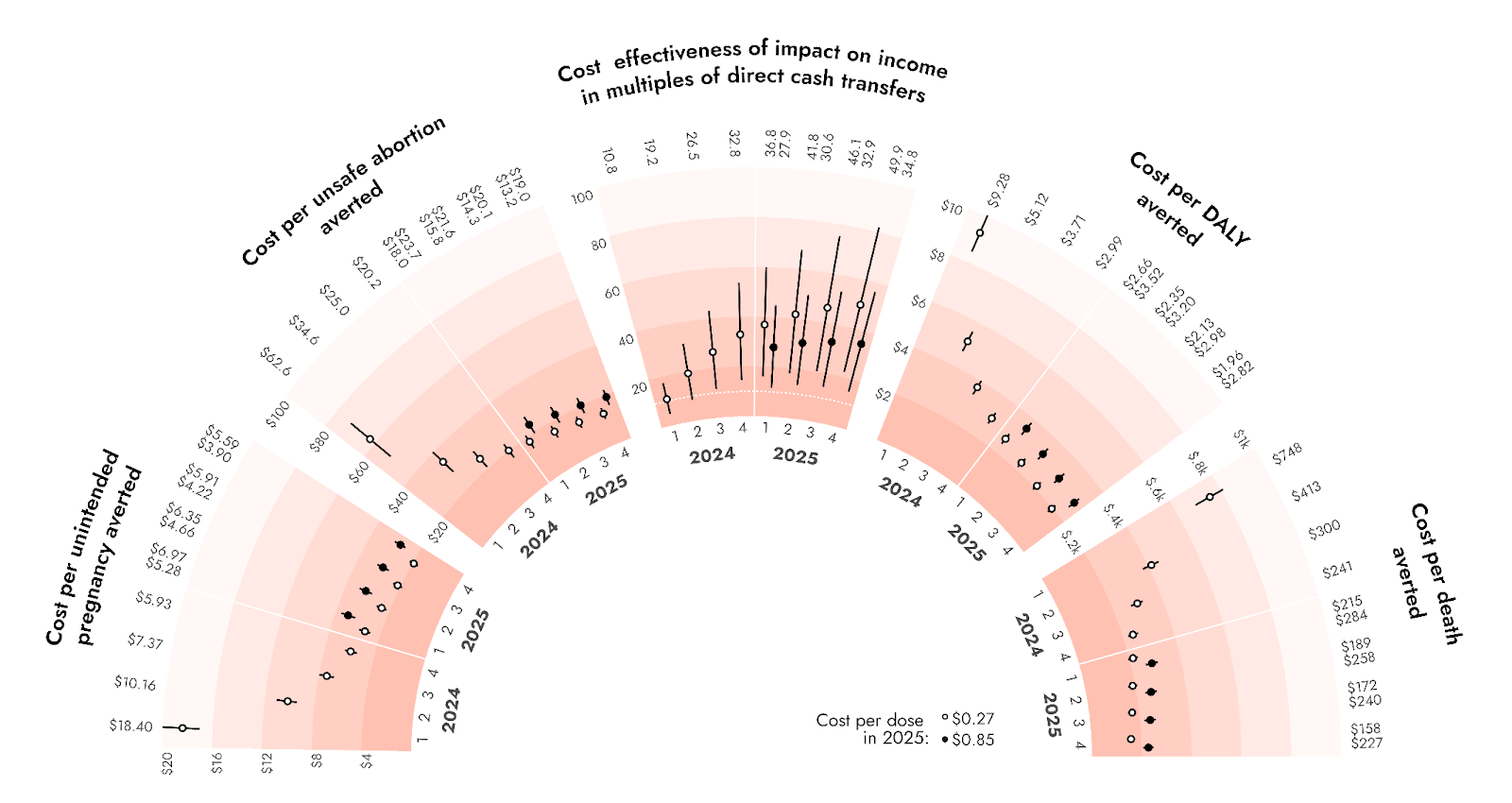Cost-effectiveness analysis of Lafiya Nigeria intervention
By Rethink Priorities, Greer Gosnell, Jamie E, Tom Hird @ 2024-10-23T22:41 (+101)
This is a linkpost to https://rethinkpriorities.org/publications/cost-effectiveness-analysis-of-lafiya-nigeria-intervention
Lafiya Nigeria commissioned Rethink Priorities to conduct a detailed cost-effectiveness analysis of its intervention. It trains women health workers to provide family planning counseling and distribute an injectable contraceptive called Sayana Press in remote parts of rural northern Nigeria. The researchers also conducted uncertainty analysis of their findings using Monte Carlo simulations.
Summary and Key Takeaways
- We model the near-term cost-effectiveness (2024-2025) of Lafiya Nigeria’s (n.d.) intervention, in which they upskill trained female health workers to provide family planning counseling and distribute injectable contraceptives (Sayana Press, or DMPA-SC) to women in remote parts of rural northern Nigeria.
- We estimate that the cost-effectiveness of the intervention is $19 per unintended pregnancy averted at the beginning of 2024, falling to $7 per unintended pregnancy by the end of 2025 when approximately calibrating the model to the current and planned rate of intervention scaling.
- We provide additional cost-effectiveness estimates, including cost per DALY averted (maternal, child, total), death averted (maternal, child, total), couple-year protection, additional contraceptive user, unsafe abortion averted, and $1 increase in women’s income, which can be found here.
- Our crude estimate of the effect of the intervention on women’s income suggests that increasing the income of women serviced by Lafiya Nigeria by $1 cost $1.20 at the beginning of 2024, and will decline to $0.20 by the end of 2025. Reproducing GiveWell’s approach to understanding these benefits in terms of multiples of cash transfers, we find that the intervention’s impact on income increases from approximately 11x cash transfers at the beginning of 2024, increasing to 53x cash transfers by the end of 2025.
- We conduct uncertainty analysis using a Monte Carlo simulation to gain insight into the effect of uncertainties from 15 inputs/factors on our cost-effectiveness estimates (Figure 1).
- Looking at the effect of uncertainty on cost per unintended pregnancy averted, in Q1 2024 the 90% highest density interval (HDI) falls in the range of $17-$20 per unintended pregnancy averted (mean cost-effectiveness is ~$18). This uncertainty narrows over time, with a 90% HDI between $3.50 and $4.30 in Q4 2025 (mean cost-effectiveness is ~$4).
- Uncertainties affect our cost-effectiveness estimation for other modeled outcomes similarly, except for the intervention’s impacts on income in multiples of cash where significant uncertainty in this estimate results in quite wide HDIs, getting wider over time with mean cost-effectiveness estimates growing from 10.8x (90% HDI 4.7x, 17.5x) in Q1 2024 to 49.9x (90% HDI 22.2x, 81.8x) in Q4 2025.
- Overall, our uncertainty analysis did not show significant variation in estimates and therefore increases our confidence in the findings of the model.

Figure 1: Uncertainty analysis summary statistics for multiple outcomes. Points represent the mean of the Monte Carlo simulation (as do numbers on the outside of the ring), with error bars representing the 90% HDI. Numbers on the inside of the ring represent the year and quarter for each estimate.
Acknowledgments

Rethink Priorities’ Greer Gosnell and Jamie Elsey wrote this report under the supervision of Tom Hird. Rethink Priorities is a research and implementation group that identifies pressing opportunities to make the world better. We act upon these opportunities by developing and implementing strategies, projects, and solutions to key issues. We do this work in close partnership with foundations and impact-focused nonprofits. We thank Lafiya Nigeria for commissioning and funding this research report. The views expressed here are not necessarily endorsed by Lafiya Nigeria. We are grateful for the invaluable input of our interviewees, and for the support and data that Klau Chmielowska and Céline Kamsteeg of Lafiya Nigeria provided throughout the project.
We invite you to explore more RP research via our database and stay updated on new work by subscribing to our newsletter.
Download the report as a PDF
Klau Chmielowska @ 2024-10-24T12:48 (+9)
Thank you for your hard work on this report, Rethink Priorities team! I would be happy to be a point of contact if anyone has any questions regarding Lafiya's model or internal inputs used for the analysis.
Rethink Priorities @ 2024-10-25T20:05 (+3)
Thank you!
Milli🔸 @ 2024-11-03T16:15 (+2)
$1 increase in women’s income
What kind of income is this? Monthly, yearly, lifetime?
Mo Putera @ 2025-07-06T09:21 (+5)
RP's CEA of LN is done by quarter, so it's quarterly. More pertinently to the part you quoted, row 144 is saying the income of the women reached for counselling is modelled as increasing by $1 for every $1.17 of all-in program cost in Q1 '24, the latter quickly dropping to just $0.25 by Q4 '25. If you're wondering what this corresponds to in terms of % increase in earnings, it's 19%, from Canning and Schultz (2019) with -20% and -40% discounts for internal and external validity respectively.